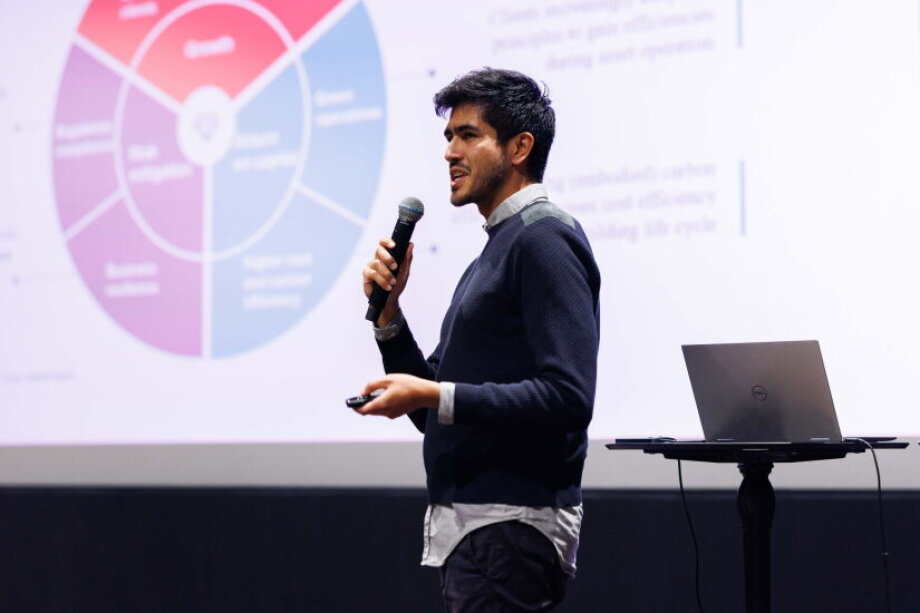Adopting circular economy to the real estate
The scarcity of materials calls for reusing instead of recycling. The real estate industry needs to move away from Take, Make, Waste to the circular model of Eliminate, Circulate, Regenerate.

The scarcity of materials calls for reusing instead of recycling. The real estate industry needs to move away from Take, Make, Waste to the circular model of Eliminate, Circulate, Regenerate.

How to adopt circular economy to real estate, was the topic discussed at the Urban Land Institute (ULI) Poland PLACES + SPACES among international and local experts in circularity.
Hans Hammink, architect and circularity lead at Cie. architectural practice in Amsterdam, and a special guest started the meeting with defining, what circularity means for him. The fact that there are currently 140 definitions of the term ‘circularity’, however, is a testament to its embryonic nature, he said, so he sticks to the principles espoused by the Ellen MacArthur Foundation: reduce energy use, reduce your CO2 footprint, do not use toxic materials and be aware that materials are scarce. The very scarcity of materials means that used materials are becoming increasingly valuable: “Circularity is definitely an opportunity for a different type of business” he stated confidently. When it comes to circularity, the way things are built is important. For example, if you use glue, it's hard to disassemble. If you use screws, it's much easier. Recycling should be the last resort. Far better to reuse materials rather than recycle them.
Hans presented the first fully circular project he was engaged in back in 2017, a 3-floor, 80m-long pavilion - part of a larger commercial project - that Cie. designed for a large bank, whose brief was to design it on circular principles. The goal was to make it energy neutral. The main structure was made from locally sourced wood, but the scheme posed a fundamental problem: it was very hard to source used materials. Finding enough used wood for a 12,000-sqm floor proved very difficult, but they managed, by using the remains from the furniture company. Securing enough glass for internal partitions was almost mission impossible. When they received news of availability in southern Holland, their hearts rose, but when they saw the glass, their spirits fell. The glass was dirty, and the frames were rough and uneven. Eventually, they turned out to be perfect for adding character and personality to the scheme - and Hans learnt an invaluable lesson which he was keen to share with the audience: when dealing with circularity, it pays to be aesthetically flexible - and then you get unexpected, brilliant results. Quoting fashion designer Paul Smith, he said: "You can find inspiration in anything. If you can't, look again".
Following the above, Ivan Acosta, a Berlin-based Senior Sustainability Consultant from Arup in Berlin, and his colleague Bartosz Marcol, Senior Sustainability Consultant based in Warsaw, presented The Circular Buildings Toolkit, which has come from Arup’s 10-year partnership and collaboration with the Ellen MacArthur Foundation. The aim of the toolkit is to stimulate a systemic change away from the current linear model in real estate - from Take, Make, Waste to the circular model of Eliminate, Circulate, Regenerate. The real estate industry, Ivan said, “needs to produce adaptive and regenerative designs that make sustainable use of natural resources.” Every developer needs to first ask if the project is actually needed, and if it is, then it needs to be built for long-term value, efficiently and with the right materials.
Monika Dębska-Pastakia, CEO of Warsaw-based Padmo Group, launched the subsequent panel discussion with the question: „why is the real estate market so slow at adopting circular economy principles and practices - especially as we don't really have any choice because resources are depleting so fast?” There are relatively few examples of buildings with circularity principles, she stated, citing a recent circularity report from January 2022, it transpires that the world is only moderately circular. Elżbieta Rotblum, Sustainability Expert for Skanska Property Poland, explained that Poland is not at the stage of scouting and harvesting already-used materials, but is simply destroying materials because it's cheaper to do that than dismantling and storing them. However, with rising energy prices and construction costs, more and more people start to think about reusing materials. Ivan Acosta noted that we had a circular system a long time ago, and the linear system took a long time to be introduced. Regulatory bodies, he stated, will need to lead the system change. In the meantime, real estate progressives need to get together to collaborate and share learning, he said. - Cost is the key issue – said Hans Hammink, adding that the tax system on used materials needs to change. Labour is taxed far higher than raw materials, and this must change, he stated. Marcin Juszczyk, Member of the Management Board and CFO/CIO of Capital Park Group added that the external drive for change will soon come, as lenders push developers to adopt circularity principles due to the ESG drive.
“We have no choice. We have to do it.” – summarized Hans and explained, that for his younger colleagues, there is no question at all - they only want to work on circular projects. „My students are the same. The younger generation has already made a mind shift”. “We want to be able design and build without waste, recycle materials, and limit resource usage. The question so far has been – how? Today we talked about material passports, urban mining, circular design models and saw some very interesting case studies. I hope they will serve as a great inspiration for our future projects” – summarized Soren Rodian Olsen, Chair of ULI Poland.
The Partners of the PLACES + SPACES
event are: Grupa Capital Park, Greenberg Traurig, Globalworth, Skanska,
Gdynia, Colliers, Cushman & Wakefield, Dentons, DWF
Poland, Echo Investment, Hines, MDDP, Van der Vorm
Group, Vastint Poland and 7R SA.